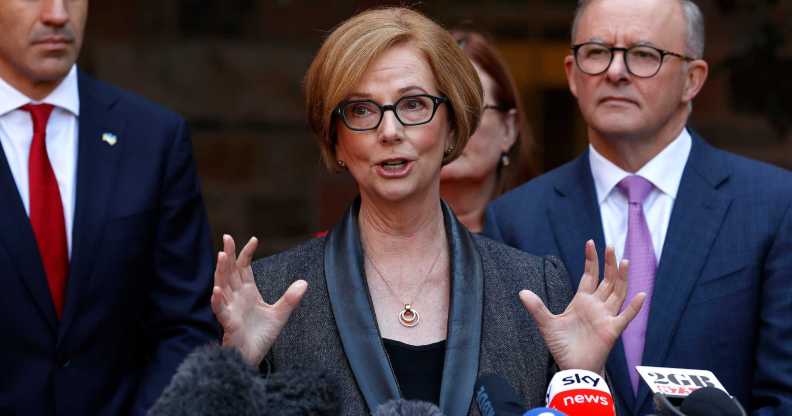Australia’s first female PM calls for ‘love and respect’ when asked tired ‘what is a woman’ question

Former Australian PM Julia Gillard was asked ‘what is a woman’ by a gender-critical activist. (Getty Images)
Former Australian prime minister Julia Gillard has called for “love, inclusion and respect” after being asked to define what a woman is by a gender-critical activist.
Julia Gillard, who served as the 27th prime minister of Australia from 2010 to 2013 and was the first woman ever to hold Australia’s highest office, spoke about women’s advancement during an event at the Government House in Adelaide on Friday (25 August).
During the event, Gillard was asked by gender-critical activist Biddy O’Loughlin: “What is a woman?”
O’Loughlin continued: “Do you agree with Queensland’s Attorney-General and Minister for Women Shannon Fentiman that trans women are women and with UK’s leader of the Labour Party Sir Keir Starmer that some women have a penis?”
When previously asked about the sex organs that women “can have”, Labour leader Starmer said: “For 99.9 per cent of women, it is completely biological … and of course they haven’t got a penis.”
Gillard pointed out that O’Loughlin’s question has become centre of a “gotcha parlour game” in the UK, before responding: “I think we’ve just got to move away from all of that and just come at this once again from first principles and say to ourselves: we as a community are full of people with diverse stories and diverse life experiences.
“Amongst that rich diversity … there are a number of people who genuinely believe that they are trapped in the wrong body and they want to be recognised as the gender their mind and soul have always told them that they are.”
The former PM called for “love, inclusion and respect … for each of those individuals” and said that issues such as prison arrangements and fairness in elite sport need be dealt with inclusively.
Gillard concluded her response by saying part of inclusivity means referring to people “the way they want to be referred to”.
“I think if we can all do that we can kind of take the temperature out of this.
“And I think the temperature is being created for political reasons often – not because it’s inherent in the discussion.”
Gillard’s thoughtful response has been attacked by the far-right pundits such as right-wing opinion columnist, Rita Panahi, who accused her of “floundering hopelessly” over the question.
Gillard spoke out in favour of same-sex marriage in 2012, despite voting against marriage equality during her premiership.
At Melbourne’s College of Law and Justice, she admitted that her position in the failed 2012 vote was “idiosyncratic”. She said that “key countries” have embraced same-sex marriage, and given the opportunity, she would vote ‘yes’ for its legalisation in Australia.
Same-sex marriage was legalised in Australia in December 2017 after a majority of respondents voted ‘yes’ to equality in a national survey on the issue.

